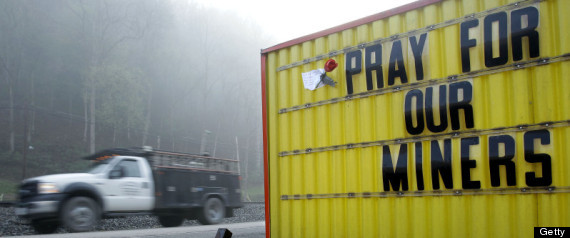 WASHINGTON -- Federal officials released a damning report Tuesday on the Upper Big Branch coal mining disaster, citing "corporate culture" at coal giant Massey Energy Co. as the "root cause" of a catastrophe that claimed 29 lives and rocked West Virginia last April.
WASHINGTON -- Federal officials released a damning report Tuesday on the Upper Big Branch coal mining disaster, citing "corporate culture" at coal giant Massey Energy Co. as the "root cause" of a catastrophe that claimed 29 lives and rocked West Virginia last April.The federal Mine Safety and Health Administration (MSHA) also imposed a civil fine of $10.8 million, the largest in agency history, and issued a whopping 369 citations and orders on the company, including an "unprecedented" 21 "flagrant violations" of safety and health standards. The mine had been operated by Performance Coal Co., a Massey subsidiary.
The result of a year and a half of investigation, the report provides the official federal record on what was the worst mining disaster on U.S. soil in four decades. Federal officials met with the families of victims Tuesday morning before releasing their findings to the general public. Officials described the 80,000-page report, which includes reams of testimony as well as internal company documents, as the most extensive investigation of a mining disaster in modern times.
"I call this closure for the investigative team," said Kevin Stricklin, MSHA's administrator of coal mine safety and health, in a call with reporters. "We don't know what the families go through. I don't walk in their shoes. I don't know that they'll ever have closure."
The report comes right on the heels of an announcement earlier today that the Department of Justice had reached an agreement with Massey's corporate parent, Alpha Natural Resources. The company has agreed to pay $210 million to avoid prosecution, including $1.5 million to each of the victim's families.
Alpha purchased Massey earlier this year for $7.1 billion, taking on any outstanding liabilities stemming from the disaster. The settlement bars Massey as a company from any criminal prosecutions but leaves open the possibility of indictments against individuals. A Massey security official was indicted for obstructing justice earlier this year.
As with an earlier investigation commissioned by the West Virginia governor, MSHA officials found that managers at Performance and Massey put profits ahead of workers' safety, and that an ingrained corporate culture of greed and recklessness ultimately led to a catastrophe that should have been prevented. Although Massey has argued that the blast was a natural disaster, federal investigators found that a preventable methane ignition triggered the explosion, which was then fueled by an accumulation of coal dust.
"The tragic explosion at Upper Big Branch left dozens of families without husbands, fathers, brothers and sons," said Hilda Solis, secretary of the Labor Department, which oversees MSHA, in a statement. "The results of the investigation lead to the conclusion that PCC/Massey promoted and enforced a workplace culture that valued production over safety, and broke the law as they endangered the lives of their miners."
Management showed a "systematic" and "intentional" pattern of covering up safety hazards at the mine, such as the inadequate ventilation and poor roof supports that contributed to the disaster, according to investigators. The mine also had an "established" practice of tipping off managers when federal and state safety inspectors were on the way.
"One dispatcher simply told us it was a part of doing business," Stricklin said.
The company went so far as to maintain two sets of safety books -- one that included known dangers, and another watered-down version that miners and inspectors could see, investigators said.
An atmosphere of intimidation also pervaded the mine. Workers who tried to bring forth safety concerns were routinely bullied by their superiors and feared losing their jobs making them unlikely to seek out inspectors. "As a result, no safety or health complaints and no whistleblower disclosures were made to MSHA from miners working in the UBB mine in the approximately four years preceding the explosion," the report notes.
Rep. John Kline (R-Minn.), chairman of the House workforce committee, condemned Massey in a statement Tuesday, citing the company for a "reckless disregard for critical worker safety protections" and for forcing miners "to face greater danger in an inherently hazardous profession."
Sen. Tom Harkin (D-Iowa) also rebuked mine management for its "blatant disregard for basic safety practices," adding that he hopes the report will "spark renewed interest on both sides of the aisle" in passing mine safety reform legislation.
Despite the condemnations from lawmakers, congressional leaders still have not managed to move any legislation to improve mine safety in the 18 months since the disaster. Members of both the House and Senate have introduced mine safety bills that would make it easier for the government to shut down mines that show a pattern of safety violations, but such legislation is unlikely to pass a Republican-led House determined to limit regulations on businesses.
"Many lawmakers seem to have forgotten about the mine safety issue altogether," Justin Feldman, worker safety advocate at the nonprofit watchdog group Public Citizen, recently told HuffPost. "I've spoken with congressional staffers who wrongly believe that a bill has been passed since the Upper Big Branch disaster."
MSHA officials will continue to carry out an internal investigation aimed at uncovering any of its own failures in the disaster, Stricklin noted.
Origin
Source: Huff
No comments:
Post a Comment